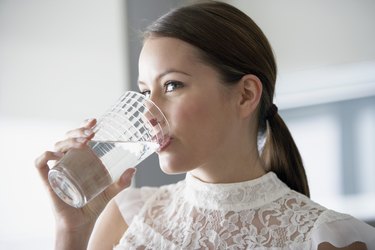
While water won't burn any extra calories, drinking lots of good old H2O may be beneficial on your weight-loss journey because it can help you better identify when you're full and provide the hydration you need to power through fat-burning exercise.
Maybe you've heard that 3 liters a day is the magic amount when you're trying to drop pounds. Well, here's what you need to know when it comes to hydration recommendations, plus tips to help you reach your ideal amount.
Video of the Day
Video of the Day
Read more: How Can I Tell When My Body Is Hydrated?
Are You Drinking Enough Water?
Even if you don't feel thirsty, you might be shorting yourself when it comes to your daily water intake.
It may seem like a lot of H2O, but the minimum daily requirement is 3.7 liters (about 15 cups) for men and 2.7 liters (about 11 cups) for women, according to 2004 research by the National Academies of Sciences, Engineering and Medicine, which is still the standard referenced by the Centers for Disease Control and Prevention.
However, keep in mind that this total should include your intake from water as well as other beverages and food.
Something else to know: How much you personally need will vary based on factors like your activity level, environment and overall health, according to the Mayo Clinic.
- Activity Level: If you're an athlete or regularly breaking a sweat in the gym, you need to hydrate even more to cover your fluid loss. For those who exercise more than an hour per day, it's advised to replenish your minerals and electrolytes with a sports drink or tablet.
- Environment: If you live in a hot climate, you may also need more water than those living in more temperate or mild areas.
- Diet: Your eating habits can also affect how much liquid you need to drink. Those who consume more water-rich fruits and vegetables may not need to fill their cup quite as much in order to stay hydrated.
Hit Your Daily Water Goal
Drinking water is an important component of any plan for fat loss because it helps fuel your workouts and flush toxins from your body, according to the Mayo Clinic. When you exercise and sweat, your body naturally loses the fluids it needs to keep you working. This is why hydrating before, during and after workouts is crucial.
Drinking adequate amounts of water during meals can also help you feel full sooner, preventing you from overeating, according to Harvard Health Publishing.
There are several practices you can introduce into your day-to-day to make sure you stay properly hydrated:
- Keep a water bottle close at hand and refill as needed throughout the day, keeping a tally as you go.
- Incorporate more fruits and vegetables into your diet, like watermelon and leafy greens, to up your overall water intake.
- Pay attention to your thirst, and keep in mind that thirst can sometimes feel like hunger. In fact, according to the Polycystic Kidney Disease Foundation, about 37 percent of people mistake the two. So, when hunger pangs strike, especially when it's not mealtime, see if a glass of water satisfies before you reach for a snack.
Read more: Does Drinking Water Reduce Bloating?
- Mayo Clinic: "Water: How much should you drink every day?"
- Harvard Health: "10 behaviors for healthy weight" loss"
- Polycystic Kidney Disease Foundation: "Hunger vs. thirst: Tips to tell the difference"
- National Academies of Sciences, Engineering and Medicine: "Dietary Reference Intakes: Water, Potassium, Sodium, Chloride, and Sulfate"
- Centers for Disease Control and Prevention: "Get the Facts: Drinking Water and Intake"